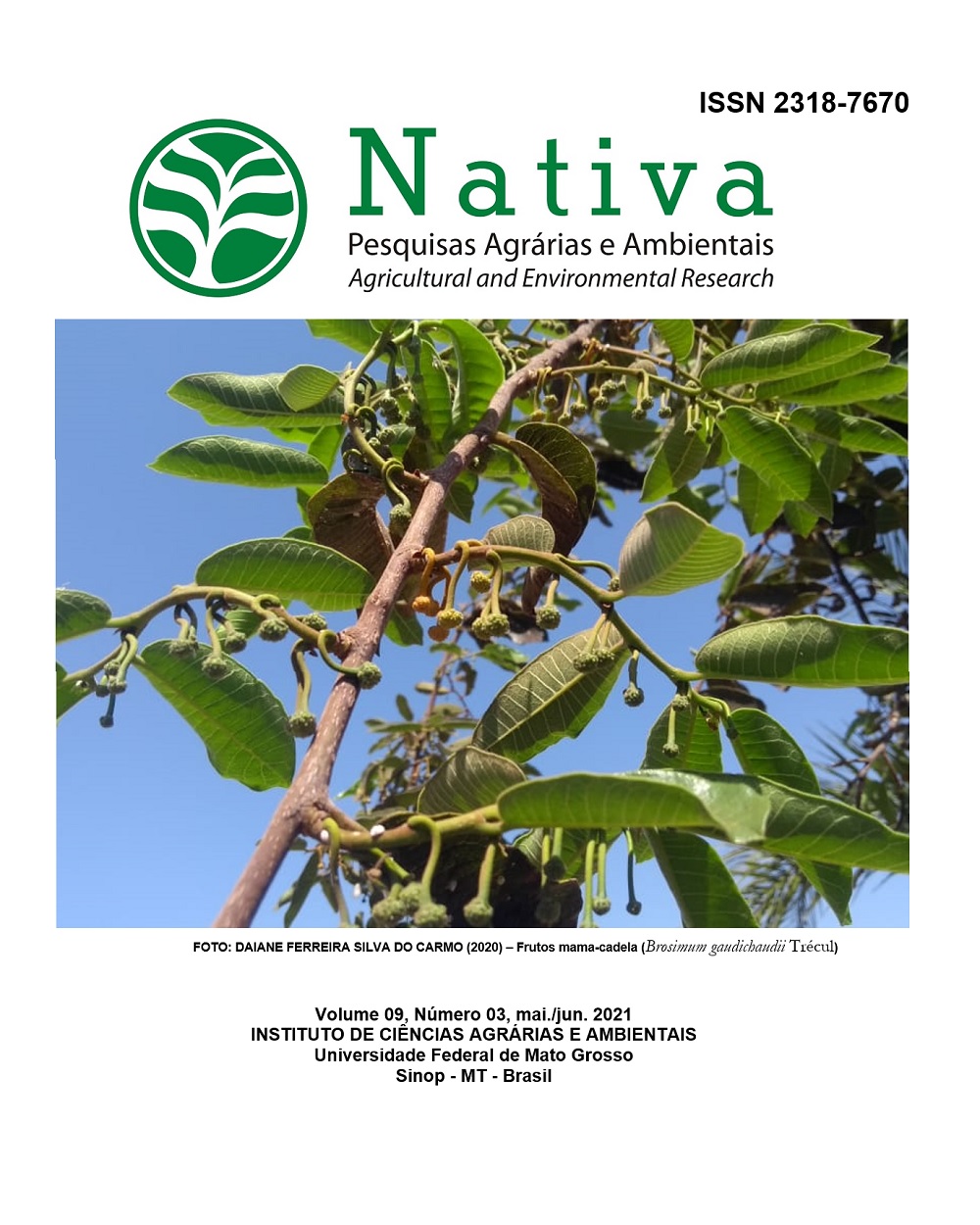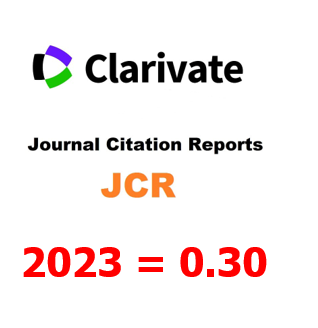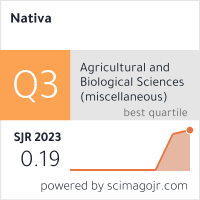EFICIÊNCIA FOTOQUÍMICA EM CLADÓDIOS DE PALMA FORRAGEIRA ‘GIGANTE’ CULTIVADA SOB DIFERENTES ESPAÇAMENTOS E ADUBAÇÃO MINERAL
DOI:
https://doi.org/10.31413/nativa.v9i3.10587Palavras-chave:
rranjo de plantas, Opuntia, plantas CAMResumo
A associação de fatores no sistema solo-água-planta-atmosfera, como adubação, espaçamento entre plantas e disponibilidade hídrica, pode influenciar a atividade fisiológica em palma forrageira nas condições adversas do semiárido. Assim, objetivou-se determinar a eficiência fotoquímica em cladódios de palma forrageira ‘Gigante’ cultivada sob diferentes espaçamentos e adubação mineral em região semiárida, no período seco e chuvoso. O experimento foi conduzido em blocos ao acaso em esquema fatorial 4 x 3 x 7, com três repetições. O primeiro fator foi constituído de quatro adubações (000-000-000; 000-150-000; 200-150-000 e 200-150-100 kg ha-1 de N-P2O5-K2O), o segundo, por três espaçamentos (1,0 x 0,5; 2,0 x 0,25 e 3,0 x 1,0 x 0,25 m) e o terceiro por sete horários de leitura (6; 8; 10; 12; 14; 16 e 18 h). Foram realizadas leituras de fluorescência da clorofila “a” em cladódios de palma forrageira nas épocas seca e chuvosa com auxílio de um fluorômetro de luz modulada. Verificou-se ajustes cúbicos para as variáveis de fluorescência da clorofila “a” ao longo dia com magnitude de respostas diferenciadas nos períodos seco e chuvoso. Os cladódios de palma forrageira ‘Gigante’ sofrem alterações no fotossistema II na época seca nas condições fisiográficas do semiárido baiano e na época de chuvas o rendimento fotossintético em cladódios de palma forrageira é considerado ideal com variações ao longo do dia.
Palavras-chave: arranjo de plantas; Opuntia; plantas CAM.
Photochemical efficiency in cladodes of ‘Gigante’ cactus pear cultivated under different spacing and mineral fertilization
ABSTRACT: The association of factors in the soil-water-plant-atmosphere system, such as fertilization, spacing between plants and water availability, can influence the physiological activity in cactus pear in the adverse conditions of the semiarid. Thus, the objective was to determine the photochemical efficiency in cladodes of ‘Gigante’ cactus pear cultivated under different spacing and mineral fertilization in the semi-arid region, in the dry and rainy season. The experiment was conducted in a randomized block design in a 4 x 3 x 7 factorial scheme with three replicates. The first factor consisted of four fertilizations (000-000-000, 000-150-000, 200-150-000 and 200-150-100 kg ha-1 of N-P2O5-K2O), the second one, by three fertilizations (1.0 x 0.5, 2.0 x 0.25 and 3.0 x 1.0 x 0.25 m) and the third by seven reading times (6 a.m., 8 a.m., 10 a.m., 12 p.m., 2 p.m., 4 p.m. and 6 p.m). Fluorite readings of “a” chlorophyll were carried out in forage palm cladodes in the dry and rainy seasons with the help of a light modulated fluorometer. Cubic adjustments wereobserved for the fluorescence variables of “a” chlorophyll along day with magnitude of differentiated responses in dry and rainy periods. The cladodes of ‘Giant’ cactus pear alterations suffer in photosystem II in the dry season in the physiographic conditions of the Bahia semi-arid and in the rainy season the photosynthetic yield in cladodes of forage palm is considered ideal with variations along the day.
Keywords: arrangement of plants; Opuntia; CAM plants.
Referências
BOLHÀR-NORDENKAMPF, H. R.; LONG, S. P.; BAKER, N. R.; OQUIST, G.; SCHREIBER, U.; LECHNER, E. G. Chlorophyll fluorescence as a probe of the photosynthetic competence of leaves in the field: A review of current instrumentation. Functional Ecology, Oxford, v. 3, n. 4, p. 497-514, 1989. DOI: http://dx.doi.org/10.2307/2389624
BORLAND, A. M.; HARTWELL, J.; WESTON, D. J.; SCHLAUCH, K. A.; TSCHAPLINSKI, T. J.; TUSKAN, G. A.; YANG, X.; CUSHMAN, J. C. Engineering crassulacean acid metabolism to improve water-use efficiency. Trends in Plant Science, Copenhagen, v. 19, n. 5, p. 327-338, 2014. DOI: http://dx.doi.org/10.1016/j.tplants.2014.01.006
BRITO, C. F. B.; DONATO, S. L. R.; ARANTES, A. de M.; DONATO, P. E. R.; SILVA, J. A. Photochemical efficiency in cladodes of ‘Gigante’ cactus pear cultivated under different spacings and organic fertilization. Revista Brasileira de Engenharia Agrícola e Ambiental, Campina Grande, v. 22, n. 5, p. 338-343, 2018. DOI: https://doi.org/10.1590/1807-1929/agriambi.v22n5p338-343
BRITO, C. F. B.; SANTOS, M. R. dos.; FONSECA, V. A.; ARANTES, A. de M.; ALMEIDA, J. R. de. Physiological characteristics and yield of ‘Pérola’ pineapple in the semi-arid region. Revista Brasileira de Engenharia Agrícola e Ambiental, Campina Grande, v. 21, n. 12, p. 834-839, 2017. DOI: https://doi.org/10.1590/1807-1929/agriambi.v21n12p834-839
CAVALCANTE, L. A. D.; SANTOS, G. R. de A.; Da SILVA, L. M.; FAGUNDES, J. L.; da SILVA, M. A. Respostas de genótipos de palma forrageira a diferentes densidades de cultivo. Pesquisa Agropecuária Tropical, Goiânia, v. 44, n. 4, p. 424-433, 2014. DOI: https://doi.org/10.1590/S1983-40632014000400010
DÍEZ, M. C.; MORENO, F.; GANTIVA, E. Effects of light intensity on the morphology and CAM photosynthesis of Vanilla planifolia Andrews. Revista Facultad Nacional de Agronomía, Medellín, v. 70, n. 1, p. 8023-8031, 2017. DOI: http://dx.doi.org/10.15446/rfna.v70n1.61736
DONATO, P. E. R.; DONATO, S. L. R.; SILVA, J. A. da; PIRES, A. J. V.; SILVA JÚNIOR, A. Extraction/exportation of macronutrients by cladodes of ‘Gigante’ cactus pear under different spacings and organic fertilization. Revista Brasileira de Engenharia Agrícola e Ambiental, Campina Grande, v. 21, n. 4, p. 238-243, 2017a. DOI: https://doi.org/10.1590/1807-1929/agriambi.v21n4p238-243
DONATO, S. L. R.; ARANTES, A. M.; BRITO, C. F. B.; RODRIGUES, M. G. V.; SILVA, J. A.; DONATO, P. E. R. Considerações sobre clima semiárido e ecofisiologia da palma forrageira. Informe Agropecuário, Belo Horizonte, v. 38, n. 296, p. 7-20, 2017b.
DONATO, P. E. R.; PIRES, A. J. V.; DONATO, S. L. R.; BONOMO, P.; SILVA, J. A.; AQUINO, A. A. Morfometria e rendimento da palma forrageira ‘Gigante’ sob diferentes espaçamentos e doses de adubação orgânica. Revista Brasileira de Ciências Agrárias, Recife, v. 9, n. 1, p. 151-158, 2014. DOI: https://doi.org/10.5039/agraria.v9i1a3252
DUBEUX JÚNIOR.; J. C. B.; SANTOS, M. V. F. dos; MELLO, A. C. L.; CUNHA, M. V. da; FERREIRA, M. de A.; SANTOS, D. C. dos; LIRA, M. de A.; SILVA, M. da C. Forage potential of cacti on drylands. Acta Horticulturae, Leuven, v. 1067, n .1, p. 181-186, 2015. https://doi.org/10.17660/ActaHortic.2015.1067.24
EMBRAPA_Empresa Brasileira de Pesquisa Agropecuária. Manual de métodos de análise de solo. 2. ed. Rio de Janeiro, RJ: Centro Nacional de Pesquisa de Solos, 1997. 212 p.
GOLTSEV, V. N.; KALAJI, H. M.; PAUNOVA, M.; BĄBA, W.; HORACZEK, T.; MOJSKI, J.; KOCIEL, H.; ALLAKHVERDIEV, S. I. Variable chlorophyll fluorescence and its use for assessing physiological condition of plant photosynthetic apparatus. Russian Journal of Plant Physiology, Moscow, v. 63, n. 6, p. 869-893, 2016. DOI: https://doi.org/10.1134/S1021443716050058
LICHTENTHALER, H. K.; BUSCHMANN, C.; KNAPP, K. How to correctly determine the different chlorophyll fluorescence parameters and the chlorophyll fluorescence decrease ratio RFd of leaves with the PAM fluorometer. Photosynthetica, Praga, v. 43, n. 3, p. 379-393, 2005. DOI: https://doi.org/10.1007/s11099-005-0062-6
MATTOS, E. A. de; HERZOG, B.; LÜTTGE, U. Chlorophyll fluorescence during CAM-phases in Clusia minor L. under drought stress. Journal of Experimental Botany, Lancaster, v. 50, n. 331, p. 253-261, 1999. DOI: https://doi.org/10.1093/jxb/50.331.253
MURCHIE, E. H.; LAWSON, T. Chlorophyll fluorescence analysis: a guide to good practice and understanding some new applications. Journal of Experimental Botany, Lancaster, v. 64, n. 13, p. 3983-3998, 2013. DOI: https://doi.org/10.1093/jxb/ert208
OJEDA-PÉREZ, Z. Z.; JIMÉNEZ-BREMONT, J. F.; DELGADO-SÁNCHEZ, P. Continuous high and low temperature induced a decrease of photosynthetic activity and changes in the diurnal fluctuations of organic acids in Opuntia streptacantha. Plos One, San Francisco, v. 12, n. 10, e0186540, 2017. DOI: https://doi.org/10.1371/journal.pone.0186540
OSMOND, C. B. Crassulacean Acid Metabolism: A Curiosity in Context. Annual Review of Plant Physiology, Los Angeles, v. 29, n. 1, p. 379-414, 1978. https://doi.org/10.1146/annurev.pp.29.060178.002115
PADILHA JUNIOR, M. C.; DONATO, S. L. R.; SILVA, J. B.; DONATO, P. E. R.; SOUZA, E. S. Características morfométricas e rendimento da palma forrageira ‘Gigante’ sob diferentes adubações e configurações de plantio. Revista Verde, Pombal, v. 11, n. 1, p. 67-72, 2016. DOI: https://doi.org/10.18378/rvads.v11i1.3710
PERERA-CASTRO, A. V.; BRITO, P.; GONZÁLEZ-RODRÍGUEZ, A. M. Changes in thermic limits and acclimation assessment for an alpine plant by chlorophyll fluorescence analysis: Fv/Fm vs. Rfd. Photosynthetica, Praga, v. 56, n. 2, p. 527-536, 2018. DOI: https://doi.org/10.1146/10.1007/s11099-017-0691-6
PIMIENTA-BARRIOS, E.; ZAÑUDO-HERNÁNDEZ, J.; MUÑOZ-URIAS, A.; MURGUÍA, C. R. Ecophysiology of young stems (cladodes) of Opuntia ficus-indica in wet and dry conditions. Gayana Botanica, Concepción, v. 69, n. 2, p. 232-239, 2012. DOI: http://dx.doi.org/10.4067/S0717-66432012000200002
QUEIROZ, M. G.; SILVA, T. G. F.; ZOLNIER, S.; SILVA, E. M. S.; LIMA, L. R.; ALVES, J. O. Características morfofisiológicas e produtividade da palma forrageira em diferentes lâminas de irrigação. Revista Brasileira de Engenharia Agrícola e Ambiental, Campina Grande, v. 19, n. 10, p. 931–938, 2015. DOI: https://doi.org/10.1590/1807-1929/agriambi.v19n10p931-938
ROMO-CAMPOS, R.; FLORES-FLORES, J. L.; FLORES, J.; ÁLVAREZ-FUENTES, G. Factores abióticos involucrados en la facilitación entre leñosas y suculentas en el altiplano mexicano. Botanical Sciences, Cidade do México, v. 91, p. 319-333, 2013.
SILVA, J. A. da; DONATO, S. L. R.; DONATO, P. E. R.; SOUZA, E. S.; PADILHA JUNIOR, M. C.; SILVA JUNIOR, A. A. Extraction/export of nutrients in Opuntia ficus-indica under different spacings and chemical fertilizers. Revista Brasileira de Engenharia Agrícola e Ambiental, Campina Grande, v. 20, n. 3, p. 236-242, 2016a. DOI: https://doi.org/10.1590/1807-1929/agriambi.v20n3p236-242
SILVA, J. A. da; DONATO, S. L. R.; DONATO, P. E. R.; SOUZA, E. S.; PADILHA JUNIOR, M. C.; SILVA JUNIOR, A. A. Yield and vegetative growth of cactus pear at different spacings and under chemical fertilizations. Revista Brasileira de Engenharia Agrícola e Ambiental, Campina Grande, v. 20, p. 564-569, 2016b. DOI: https://doi.org/10.1590/1807-1929/agriambi.v20n6p564-569
SCHOCK, A. A.; RAMM, A.; MARTINAZZO, E. G.; SILVA, D. M.; BACARIN, M. A. Crescimento e fotossíntese de plantas de pinhão-manso cultivadas em diferentes condições de luminosidade. Revista Brasileira de Engenharia Agrícola e Ambiental, Campina Grande, v. 18, n. 1, p. 3-9, 2014. DOI: http://dx.doi.org/10.1590/S1415-43662014000100001
STRAUSS, A. J.; KRÜGER, G. H. J.; STRASSER, R. J.; VAN HEERDEN, P. D. R. Ranking of dark chilling tolerance in soybean genotypes probed by the chlorophyll a fluorescence transient O-J-I-P. Environmental and Experimental Botany, Elmsford, v. 56, n. 2, p. 147-157, 2006. https://doi.org/10.1016/j.envexpbot.2005.01.011
TAIZ, L.; ZEIGER, E.; MOLLER, I. M.; MURPHY, A Fisiologia e desenvolvimento vegetal. 6 ed. Porto Alegre: Artmed, 2017. 858p.
Publicado
Versões
- 2023-10-02 (2)
- 2021-08-04 (1)
Edição
Seção
Como Citar
Licença
Copyright (c) 2021 Nativa

Este trabalho está licenciado sob uma licença Creative Commons Attribution-NonCommercial 4.0 International License.
Direitos Autorais para artigos publicados nesta revista são do autor, com direitos de primeira publicação para a revista. Em virtude de a aparecerem nesta revista de acesso público, os artigos são de uso gratuito, com atribuições próprias, em aplicações educacionais e não-comerciais.
A artigos publicados nessa revista, podem ser reproduzidos parcialmente ou utilizados como referência por outros autores, desde que seja cita a fonte, ou seja, a Revista Nativa.
Copyright for articles published in this journal are the authors, with first publication rights granted to the journal. The journal shows open access, and articles are free to use, with proper attribution, in educational and non-commercial.
The articles published in this journal may be reproduced in part or used as a reference by other authors, provided that the source is quoted.






